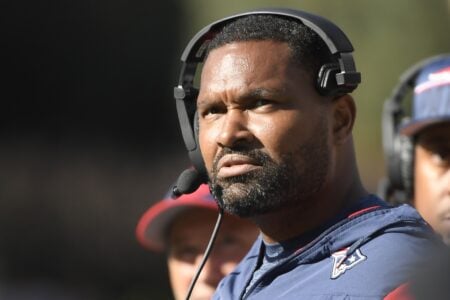VJCPatriot
Pro Bowl Player
- Joined
- Apr 28, 2006
- Messages
- 16,800
- Reaction score
- 5,463
Registered Members experience this forum ad and noise-free.
CLICK HERE to Register for a free account and login for a smoother ad-free experience. It's easy, and only takes a few moments.by the actual letter of the law, the ruling was correct. rule 3, section 2, article 7 has a note for exactly this situation:
the only possible judgment call is what constitutes "possession", and to me, a hand coming off the ball means he didn't have "a firm grip and control of the ball", nor did he have "complete and continuous control of the ball until after his initial contact with the ground".
.
Butler has nothing to worry about. The ref stumbled and fell into Butler. Butler actually prevented him from falling. It was incidental contact.
You can see it in the replays.
There is nothing wrong with the rule. All rules produce awkward looking results but if you think it's a bad rule how do you change it, remembering it applies to ALL fumbles.
at which point we would burn this place to the ground over such an outrage.
This was garbage plain and simple. Imo a fumble didn't occur since the ball never transfered between players or hit the ground.
If the offense loses the ball and it rules 15 yards downfield and out of bounds at the 1 yard line you are ok, but one yard further and you lose possession of the ball?
#6 low sideline view
here's just the part where he loses control and is trying to secure the ball. you can clearly see his right hand come off of the ball:
Well, yes. The end zones are special parts of the field. Different than any other parts of the field. There are different rules in the end zones.
That second one is an interesting shot, because I agree that his hand comes off the ball but oddly enough the ball seems pressed up against his body the whole way (when his hand is off the ball his arm is still pressed against it). That would still count as control, right?
Alright, so this is slight digression but relevant in that it relates to control and possession of a fumble.............
Does anyone remember the 2009/10 playoff games against the Ravens when the Pats got credited with a questionable muffed punt recovery...........
fwd to the 37:20 mark of this video..........
I think we can all agree that the Pats player loses the ball on his way to the ground and never should have been credited with possession. Shockingly the Ravens didn't challenge.
This is precisely the correct analogy. But--I would say that even if Arrington didn't lose the ball, it was not a fumble because his second foot/knee was out of bounds. Same deal with ASF. Even though he never lost the ball, his body was out of bounds before he could get possession.
So there are 2 terms here that require distinction; Control and Possession.
Control is having the ball in your hands securely.
Possession is qualified by having established control and having 2 feet, a knee or body in bounds.
Possession is the key
If you are deemed to have possession just before hitting the ground you cannot lose control of the ball as you hit the ground. Movement of the ball after you have established possession does not necessarily constitute loss of possession (Para 3 Rule3 section 2).
Riveron's quote today from PFT "“By rule, he has to re-establish possession. He must regain control of the football again before he hits out of bounds,” Riveron said. “He has not regained control of the football before he hits out of bounds.”
He seems to use possession and control without distinction. I believe his last sentence should be possession and not control.
ASJ has to regain possession before he goes out of bounds.
That second one is an interesting shot, because I agree that his hand comes off the ball but oddly enough the ball seems pressed up against his body the whole way (when his hand is off the ball his arm is still pressed against it). That would still count as control, right?
I was wrong about the outcome of the game, but this isn't a good football team right now.
There are several pictures of the ball out of his possession in mid air, but i have yet to see a definitive picture of the ball out of his possession when he lands in the EZ. And by that logic, how the hell do you overturn a call like that without any clear evidence?
It's a solid rule, why should the team that fumbled the ball through the end zone be rewarded? They aren't rewarded when they fumble it through their own end zone, why should they be if they fumble it through the opposition's end zone














